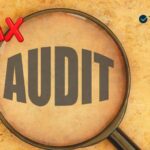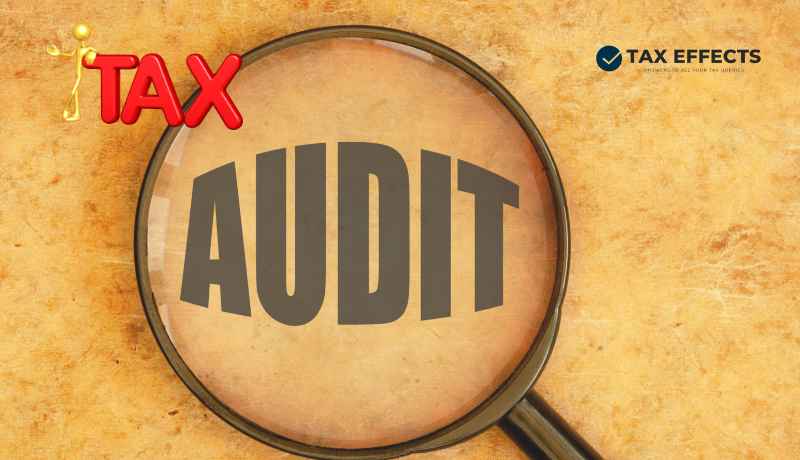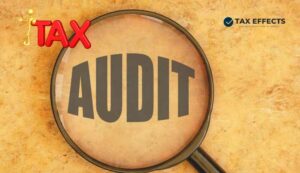In this article, we will discuss in detail about Tax Audit & its applicability under Section 44AB of the Income Tax Act, 1961.
Tax Audit meaning:
Section 44AB of the Income Tax Act, 1961 specifies that every person who earns income by any business or profession has to maintain his books of accounts & get a tax audit done except those who opted for presumptive taxation under section 44AD, 44ADA, 44AE of the income tax act, 1961 or if their turnover exceeds the specified threshold limit of Rs 1 Crore.
Tax Audit refers to the activity in which an auditor examines or reviews the accounts of a business to check for tax compliance.
Some companies are legally required to carry out regular audits under Section 44AB of the Income Tax Act, 1961 & for them performing periodic tax audits is mandatory.
The main goal of a tax audit is ensuring that the details related to the income, expenditure & tax-deductible expenditure information are filed correctly by the business undergoing audit.
Who need to get tax audit done?
1. Any self-employed individual who is engaged in a business with an annual turnover of Rs. 1 crore & above.
2. A self-employed professional whose income receipts aggregate Rs. 50 lakhs or more in a financial year.
3. An individual who qualifies for the presumptive taxation scheme under Section 44AD & Section 44ADA but claims that the specified profits (8%/6%, as the case may be) are lower than those calculated in accordance with the presumptive taxation scheme for the financial year.
Provided, if:
- a) Aggregate of all amounts received including amount received for sales, turnover or gross receipts during the previous year, in cash, does not exceed 5% of the said amount and
- b) Aggregate of all payments made including amount incurred for expenditure, in cash, during the previous year does not exceed 5% of the said payment.
Threshold limit would be 10 crores instead of 1 crore.
Note –
i) Payment/receipt by a cheque/draft, which is not account payee, shall be deemed to be payment/receipt in cash.
ii) Professionals are not entitled to claim an enhanced turnover limit of Rs. 10 crores u/s 44ADA. In other words, more than 95% of the business transactions should be done through banking channels.
4. An individual who qualifies for the presumptive taxation scheme under Section 44AE (Plying, hiring or leasing goods carriages having not more than ten goods carriage vehicles), Section 44B (Non-Resident Shipping Business), Section 44BBA (Non-Resident Aircraft Business), Section 44BB (Non-resident assessee engaged in exploration of mineral oil) & Section 44BBB (Foreign Company engaged in Civil Construction) but claims that the profits are lower than those calculated in accordance with the presumptive taxation scheme.
5. If an assessee, who has qualified for taxation under the presumptive taxation scheme opts out of it after a specified period. After opting out of the presumptive taxation scheme, the assessee is not allowed to opt into the presumptive taxation scheme for a continuous period of 5 assessment years.
Exception of Tax Audit for Individual having turnover exceeding Rs 1 crore but up to Rs 2 crores:
– If an Individual whose gross receipts or turnover from business exceeds Rs 1 crore but is up to Rs 2 crores, then he can opt for Presumptive Taxation under section 44AD of Income Tax Act, 1961 then he will not be liable to maintain books of accounts u/s 44AA & also will not be liable for tax audit u/s 44AB of Income Tax Act, 1961 if he discloses the required percentage of profit as required u/s 44AD of Income Tax Act, 1961.
– This Section is applicable only for Resident Individual, HUF or Resident Partnership Firm (not Limited Liability Partnership)
– The required percentage of profit as required to be disclosed u/s 44AD of Income Tax Act, 1961 is as follows:
- a) 6% of Gross receipt or total turnover if the amount is received through any mode other than cash.
- b) 8% of Gross receipt or total turnover if the amount is received through cash mode.
- c) No further deduction of business expenditure will be allowed from section 28 to Section 43 of Income Tax Act, 1961 under the head business income & it will be deemed to have been allowed.
Goals & Objectives of a Tax Audit:
– To make sure that even medium and small business owners maintain book of accounts, ledgers as well as receipts for revenue and expenses properly.
– To report observations or discrepancies after a methodical examination of the books of account of the business.
– To report prescribed information including compliance of different provisions of the Income Tax laws such as tax liability, tax paid, eligible refund amount, etc.
– To enable the tax authorities to verify the correctness of income tax returns filed by the business owner.
– To make it easy for the tax assessing authorities engaged in carrying out routine verifications to calculate and verify information such as total income, claim for deductions, etc. furnished by the taxpayer.
– To identify and restrict any fraudulent practice by businesses.
Forms for Submission of a Tax Audit:
Form 3CA: This form is required to be furnished by a person who is carrying on a business or profession that requires that accounts are audited under any rule other than Section 44 and its subsections.
Form 3CB: This form is required to be furnished by a person who is carrying on business or profession which does not require that his accounts are audited under any rule except Section 44 and any of its subsections.
Form 3CD: If either of the aforementioned audit reports is prepared, the tax auditor must furnish the required particulars using Form 3CD.
In India, Tax audit reports under various subsections of 44 can only be prepared by qualified chartered accountants. Currently tax audit reports from chartered accountants are filed electronically with the Income Tax Department.
Once the chartered accountant has filed the tax audit report, the taxpayer must approve the submitted reports using their Income Tax e-Filing account with the Income Tax department of India.
Due date for Filing Tax Audit Report:
Any assessee to whom section 44AB applies should get his accounts audited & should obtain the audit report on or before 30th September of the relevant assessment year.
If not extended, the tax audit report for the financial year 2021-22 should be obtained by 30th September 2022. The due date to file an income tax return (Business requiring audit other than transfer pricing) is 31st October 2022.
A chartered accountant must electronically file the tax audit report with the Income Tax Department.
This rule is applicable for an individual, a working partner of a firm, a company or other entities such as proprietorship, firm who audit their accounts from chartered accountants to file income tax returns.
Under Section 92E of the Income Tax Act, 1961, every person who has entered into an international transaction or a specified domestic transaction, is required to obtain a report from a chartered accountant and furnish it on or before a specified date in the prescribed form, signed and verified by the accountant in a prescribed manner.
The last date for filing income tax return for such taxpayers will be November 30, 2022.
Penalties for not filing a Tax Audit Report in India:
As per Section 271B, an Assessing Officer may impose a penalty if a person who is required to comply with section 44AB fails to get his accounts audited in respect of any year or years. The penalty shall be lower of the following amounts:
- a) A lump sum fine of Rs. 1.5 lakh
- b) 0.5% of total sales, turnover or gross receipts for the current financial year
However, as per Section 273B, no penalty would be imposed on the tax payer if a valid reason is provided with proof regarding why the tax audit was not completed in a timely manner.
Disclaimer: The information contained in this website is provided for informational purposes only, and should not be construed as legal/official advice on any matter. All the instructions, references, content, or documents are for educational purposes only and do not constitute legal advice. We do not accept any liabilities whatsoever for any losses caused directly or indirectly by the use/reliance of any information contained in this article or for any conclusion of the information.









